This Is Probably Silly, But Would You Mind Breaking Down The Genders Of Bees In The Hive And Some Of
This is probably silly, but would you mind breaking down the genders of bees in the hive and some of the roles the various genders take on? I've heard mixed things about what gender drones are, males dying immediately after sex with the queen (?), and I'm wondering how and when the hive produces another queen! Thank you so much, your patience and knowledge are hugely appreciated. Also, are there any cool insects that can change sex like frogs and fish occasionally can?
There is no such thing as gender in animals besides humans and gender roles aren’t based on anything other then misogyny and they don’t exist within animals.
What you’re specifically asking about is called castes, and your typical eusocial species of bee such as a honeybee have three castes; workers, drones and a queen.

A queen’s function within the hive is to lay eggs, while a drones only purpose is to mate. The workers are tasked with every other role within the colony including cleaning, disposing of the dead or diseased, nursing, guarding and protecting the hive, foraging for pollen and nectar, and so on.
The queen lays two types of eggs; haploid (half the amount of chromosomes which is 16 in bees) and diploid (both sets of 32 chromosomes) eggs. The haploid eggs become drones meaning that they have no fathers, this is a type of parthenogenesis called arrhenotoky.
The normal diploid eggs (chromosomes sets from the queen + one of the drones that mated with her) can become either workers or a new queen. Every single diploid egg has the potential to become a queen. It is diet in the larval stage that determines if the egg will be a queen or a worker.
The workers will create a new queen themselves by building a specific brood comb called a queen cup, once the old queen has laid an egg in them, the workers will begin feeding them entirely on royal jelly: a secretion from the hypopharynx of nurse worker bees while larvae that will become workers are fed some royal jelly but mostly a mixture of pollen and nectar called bee bread. Because the royal jelly is so protein-rich it provides the future queen larvae with the energy to develop into a sexually mature females.

Once the queen emerges from her cell fully-mature she will seek out other recently hatched virgin queens and unemerged queens and killed them as they are rivals: there can only be one queen after all. When the virgin queen is the sole survivor she’ll then leave the hive for the first (and often the last and only time) for her mating flight. Bees mate on the wing, so swarms of drones will chase after her competing for the chance to mate with the single queen, these are called drone comets.
If a drone is lucky enough to mate with the queen, he’ll insert his penis into her before it is torn off (and often left inside the queen). This causes the drones to fall to the ground and die shortly after. The queen will mate with multiple drones sporing their sperm inside an organ called the spermatheca in which she uses to fertilise and lay her eggs.
Here’s a queen with the penis of a drone still plugged inside her, otherwise known as the mating sign.

Not all drones get this chance to mate, and often die outside the hive because they’re evicted for reasons like lack of resources, the hive not being healthy / strong, or it’s the end of the bee season going into winter. Drones are relatively expendable within the hive and are useless at feeding themselves so they die pretty quickly.
More Posts from Thejoyofscience and Others

Hematopoietic stem cells ready for re-injection. Image from Steve Gschmeisserner.

WHY you shouldn’t feed these 10 foods to your dog
Dogs might think they’re human, but their physiology is not like ours. Humans might eat a wide variety of foods with little concern, but there are some very common human foods which you should not feed to your canine companion. You’ve probably seen the foods on this list before, but this is WHY these foods should not be fed to dogs.

Chocolate, Theobromine and Caffeine:
Everybody’s heard that chocolate is bad for dogs, and it’s true. Chocolate contains a compound called Theobromine. Theobromine is a type of compound called a methylxanthine, and another methylxanthine you might be more familiar with is caffeine. We know quite a lot about these compounds, as humans use them both medicinally and recreationally. The long version is that they all inhibit phosphodiesterase and antagonise adenosine receptors. The short version is that they increase muscle activity, including the heart, and stimulate the central nervous system.
This presents as dogs that have fast and irregular heart rates, high body temperatures and increased muscle activity that can progress to seizures.
It takes a reasonable amount of chocolate to poison a dog. One M&M isn’t going to do it. For a 35kg dog it’s going to take at least 3500mg of theobromine, which is about 5kg of typical milk chocolate. But only 1.2kg of dark chocolate or 600g of cooking chocolate, which is possible.
A 10kg dog needs much less. 1.5kg of milk chocolate would do it, which is only about 3 large Easter Bunnies, or 300g of dark chocolate, which is one packet from the cooking isle.
Chocolate is super tasty, dogs will absolutely gorge themselves on all chocolate available, so it’s not too difficult to poison smaller dogs with it.
And even if you get the dog through the toxicity, the high fat content of chocolate can go on to cause other gastrointestinal problems.
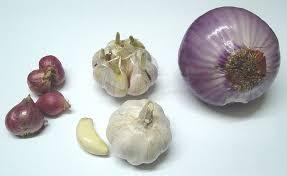
Onions & Garlic:
Yes, I said onions AND garlic. All allium species contain the same potentially toxic compounds, whether raw or cooked. That goes for spring onions too, it’s just really difficult to convince a dog to eat enough of them to be poisoned. These plants cause a Heinz body anaemia by inducing oxidative damage to the surface of the red blood cells, and for some reason breeds of Japanese origin like the Akita and Shiba Inu seem particularly prone to this toxicity.
It usually takes 10 to 15g per kg of body weight to poison a dog, but those breeds can be affected by as little as 5g per kilo. So for a big, 35kg dog, that’s about three medium sized onions.
Poisoning can happen all in one go, or it can happen by eating small amounts over a longer period of time, which is why it’s infuriating to see garlic being suggested as a natural remedy for things.
Bad cases will have to be treated with a blood transfusion as there is no direct antidote. And for interest, there are other things that can cause Heinz body anaemia too, like zinc.
Keep reading
My blog is a private thing that is open to everyone in the world except to the people I know in real life.
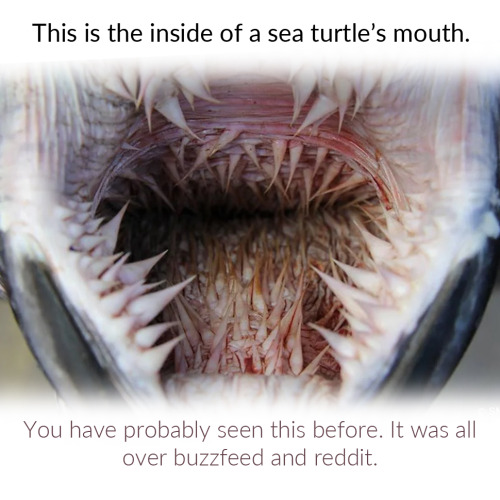
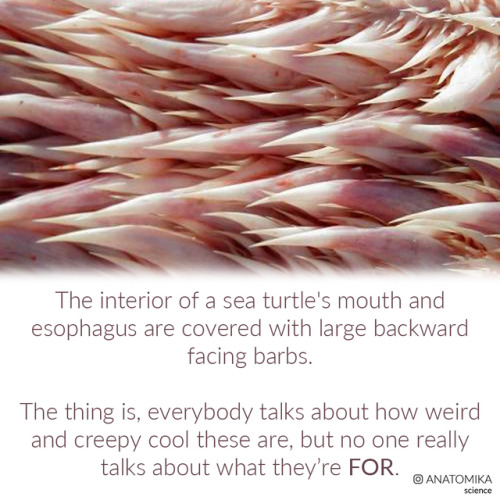
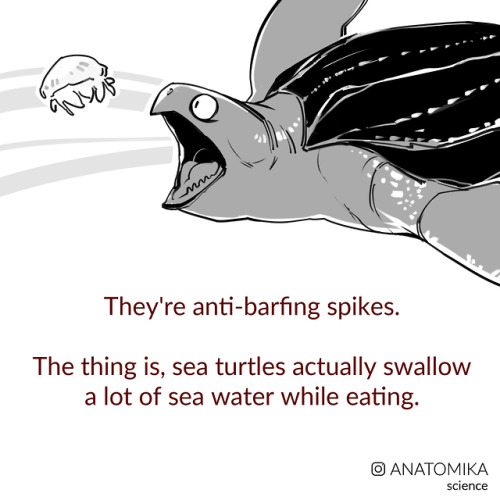
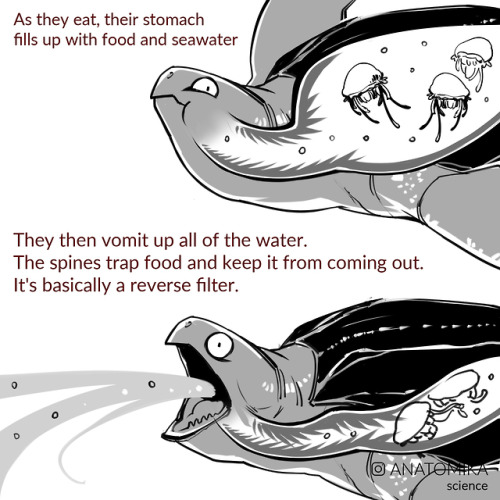
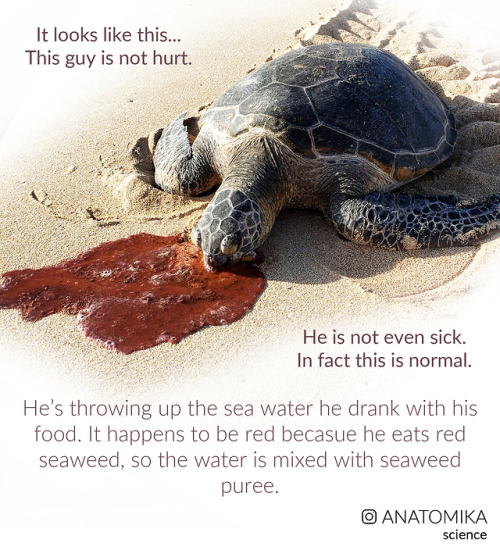
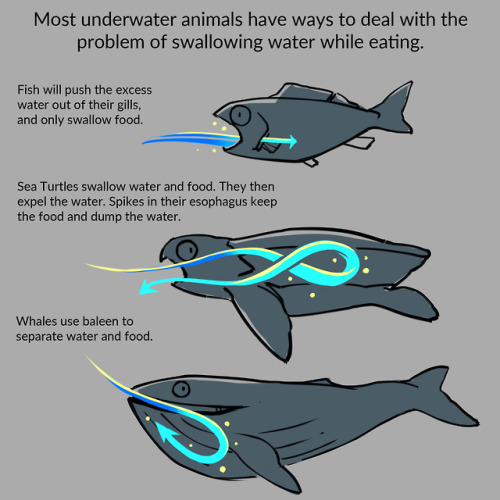
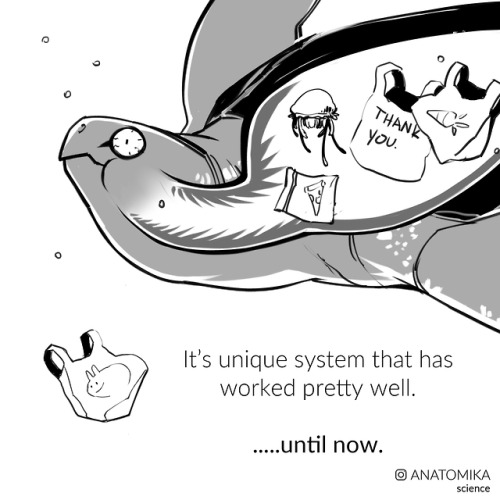
ANTI-BARFING SPIKES.
This is why they have such a problem with plastic bags. It’s because the unique structure of their esophagus makes it so that they can’t get rid of them.
Other places to see my posts: INSTAGRAM / FACEBOOK / ETSY / KICKSTARTER

Ms. Holly Aaron, Dr. Karen Dehnert, Dr. Scott Laughlin, and Dr. Carolyn Bertozzi
University of California, Berkeley, California, USA Specimen: Fucosylated glycans in a zebrafish embryo. Technique: Confocal microscopy


Urine sediment from a 6 year-old, male-intact, Rottweiler. The patient has a multi-year history of recurrent urinary tract infections. He recently presented to his primary care veterinarian for being unable to urinate. Radiographs showed no bladder stones, but a penile ultrasound showed many obstructing the urethra. The dog was then referred for surgery to relieve the obstruction…
*
The surgeons were kind enough to snag us some urine! The urine was full of these hexagonal crystals….consistent with cystine crystals! Yes, the amino acid cystine. In addition, there were all shapes of sperms (see them swimming in the background!) along with many inflammatory cells and some bacteria.
*
Diagnosis: Cystine crystalluria. This is a very rare occurrence in veterinary medicine! Such patient’s often have a genetic defect in the metabolism or transport of cystine, allowing the amino acid to accumulate in blood. Once it filters into urine, cystine will polymerize into crystals and sometimes form stones. Cystine stones do not obstruct x-rays…hence they cannot be found on standard radiographs (termed radiolucent). The patient is recovering well following surgery, and may require a special diet to help with his disease.

Colleen Conway-Welch (1944-2018) was an American nurse, known for her public health advocacy and numerous projects. She served as Dean of the Vanderbilt University School of Nursing for almost 30 years.
She received her doctorate from New York University and went on to work in various hospitals and universities throughout the United States. Under her leadership at VUSN, the university introduced an accelerated master’s programme and a PhD programme. She was named a Living Legend by the American Academy of Nursing.
Me whenever I see a corporate ad trying to say “we’re all in this together”:

-
 technospaceviking liked this · 3 years ago
technospaceviking liked this · 3 years ago -
 lyaley liked this · 3 years ago
lyaley liked this · 3 years ago -
 mix-force liked this · 3 years ago
mix-force liked this · 3 years ago -
 lootmates liked this · 3 years ago
lootmates liked this · 3 years ago -
 scorch--heart liked this · 3 years ago
scorch--heart liked this · 3 years ago -
 blackwaxidol liked this · 3 years ago
blackwaxidol liked this · 3 years ago -
 sobbinghorses liked this · 3 years ago
sobbinghorses liked this · 3 years ago -
 ankhmeanswombman reblogged this · 3 years ago
ankhmeanswombman reblogged this · 3 years ago -
 walmartbikerack liked this · 4 years ago
walmartbikerack liked this · 4 years ago -
 ayumunoya liked this · 4 years ago
ayumunoya liked this · 4 years ago -
 tryandcatchme reblogged this · 4 years ago
tryandcatchme reblogged this · 4 years ago -
 tryandcatchme liked this · 4 years ago
tryandcatchme liked this · 4 years ago -
 pinkdorkyblizzardstudent liked this · 4 years ago
pinkdorkyblizzardstudent liked this · 4 years ago -
 sunshine-tattoo reblogged this · 4 years ago
sunshine-tattoo reblogged this · 4 years ago -
 sunshine-tattoo liked this · 4 years ago
sunshine-tattoo liked this · 4 years ago -
 please-just-enough liked this · 4 years ago
please-just-enough liked this · 4 years ago -
 cobaltbluejayy liked this · 4 years ago
cobaltbluejayy liked this · 4 years ago -
 littlepear3 reblogged this · 4 years ago
littlepear3 reblogged this · 4 years ago -
 chemenzia liked this · 4 years ago
chemenzia liked this · 4 years ago -
 blueanpurple liked this · 4 years ago
blueanpurple liked this · 4 years ago -
 twistitch reblogged this · 4 years ago
twistitch reblogged this · 4 years ago -
 twistitch liked this · 4 years ago
twistitch liked this · 4 years ago -
 firemoon42 reblogged this · 4 years ago
firemoon42 reblogged this · 4 years ago -
 eeyorecoded reblogged this · 4 years ago
eeyorecoded reblogged this · 4 years ago -
 eeyorecoded liked this · 4 years ago
eeyorecoded liked this · 4 years ago -
 w1l50n117 liked this · 4 years ago
w1l50n117 liked this · 4 years ago -
 c0llapsingstar liked this · 4 years ago
c0llapsingstar liked this · 4 years ago -
 trust-me-im-cooler-than-this liked this · 4 years ago
trust-me-im-cooler-than-this liked this · 4 years ago -
 blue-marsian liked this · 4 years ago
blue-marsian liked this · 4 years ago -
 polarp0ps reblogged this · 4 years ago
polarp0ps reblogged this · 4 years ago -
 neutrinocooper liked this · 4 years ago
neutrinocooper liked this · 4 years ago -
 blueackles liked this · 4 years ago
blueackles liked this · 4 years ago -
 potatointherain reblogged this · 4 years ago
potatointherain reblogged this · 4 years ago -
 potatointherain liked this · 4 years ago
potatointherain liked this · 4 years ago -
 demonicapex liked this · 4 years ago
demonicapex liked this · 4 years ago -
 thatspacegay liked this · 4 years ago
thatspacegay liked this · 4 years ago -
 unofficially-nasa reblogged this · 4 years ago
unofficially-nasa reblogged this · 4 years ago -
 mortigem liked this · 4 years ago
mortigem liked this · 4 years ago -
 succpunk liked this · 4 years ago
succpunk liked this · 4 years ago
An assortment of scientific things from the wonderful world of biology
77 posts
